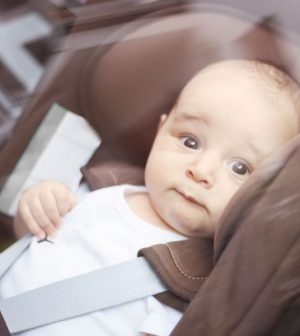- Could Your Grocery Store Meat Be Causing Recurring UTIs?
- Are You Making This Expensive Thermostat Error This Winter?
- Recognizing the Signs of Hypothyroidism
- 10 Strategies to Overcome Insomnia
- Could Artificial Sweeteners Be Aging the Brain Faster?
- Techniques for Soothing Your Nervous System
- Does the Water in Your House Smell Funny? Here’s Why
- Can a Daily Dose of Apple Cider Vinegar Actually Aid Weight Loss?
- 6 Health Beverages That Can Actually Spike Your Blood Sugar
- Treatment Options for Social Anxiety Disorder
Are You Car Seat Savvy?

You know that wearing seat belts and putting kids in appropriate car seats can save lives, but are you doing all you can to make your car a safe environment for little ones?
Hundreds of thousands of car seats are recalled for safety defects every year, with more than 6 million recalled in 2014, the largest in U.S. history. But according to the U.S. National Highway Traffic Safety Administration, less than half have been repaired.
To see if a car seat you owned has been recalled, go to http://www-odi.nhtsa.dot.gov/recalls/childseat.cfm. The database lists 10 years of recalls. If your car seat model is listed, there will typically be steps to follow to correct the problem.
It’s equally helpful to register your car seat, a step only 42 percent of buyers do. Mail in the card that came with the seat or register online — all you need is the model number and date of manufacture, which can be found on the seat’s label. This enables the manufacturer to contact you in case of a recall. You can easily register car seats at http://www.safercar.gov/parents/CarSeats/Car-Seat-Registration.htm.
Using car seats and seat belts in your own car is a no-brainer, but do you use them in other situations, like a taxi or public van? In some states, it’s mandatory to use car seats and seat belts in taxis, while in others, these vehicles are exempt. But that doesn’t mean you shouldn’t use them anyway. Riding in the rear seat doesn’t offer any special protection, so buckle up!
For air travel, the American Academy of Pediatrics and the Federal Aviation Administration recommend using car seats inflight for children who weigh less than 40 pounds. Check with your airline for specifics.
More information
The U.S. National Highway Traffic Safety Administration has detailed car seat recommendations for children of all ages.
Source: HealthDay
Copyright © 2026 HealthDay. All rights reserved.










